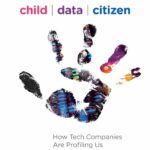Child Data Citizen Book is out !

In December 2020, as an early Christmas present, I was thrilled to hold the Child Data Citizen book freshly published by the MIT Press! In these two hundred pages, I have condensed the heart of my three-year research project on the datafication of family life and, in particular, the construction of our children into data subjects.
I believe this book is part of a necessary collective movement to raise awareness and build knowledge about how automated data collection, cross-analysis and selling threaten our freedom of expression, self-representation, and non-discrimination.
The book is divided in three different parts: the Child, the Data, the Citizen. The first part of the book (The Child: two chapters) explores how the social world of the family is becoming datafied under surveillance capitalism, and this is leading to the everyday production of large amounts of children’s data. This part engages with critical debates about techno-dependency, parental consent, and data-tracking in family life.
The second part of the book (The Data: four chapters) discusses four different types of children’s data flows: social media data, health data, educational data, and home life data. This section combines ethnographic findings with an analysis of business models and data policies. In this part of the book, I argue for the importance of moving beyond understandings of ‘personal data’ as a unique umbrella term and to actually reflect on the different ‘typologies’ of data that are collected from family life, as well as on their different impact. In the third part of the book (The Citizen: two chapters) my aim was to critically reflects on the complex relationship between children’s data flows and the datafication of citizens form birth. These last two chapters combine an analysis of the latest research in the field of data justice and algorithmic bias with theories of personhood and digital citizenship. These sections discuss what it means to think of children as datafied citizens, and engage with key questions about individual rights, inequality, and algorithmic bias.
I am looking forward to hearing about people’s reactions and thoughts on this work !
You can find it on the MIT Press website here.
